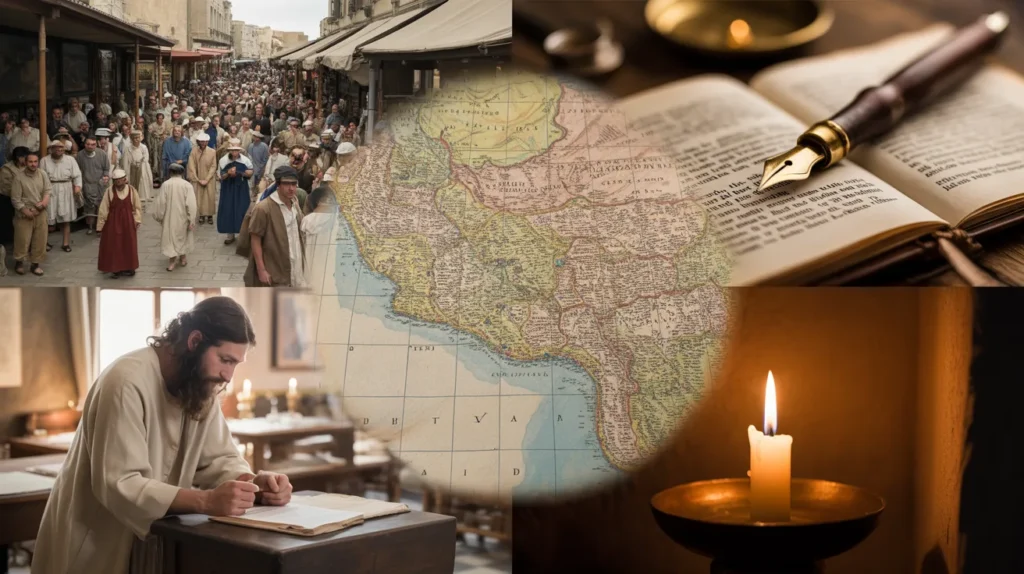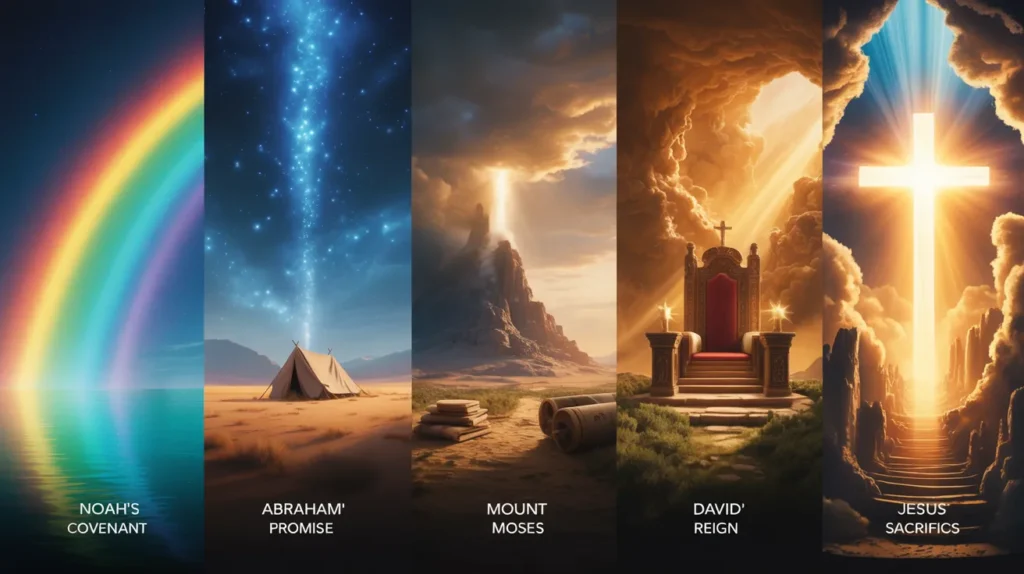Have you ever stopped to consider the grand narrative that weaves its way through the pages of Scripture? From the majestic creation of the world to its ultimate renewal, the Bible tells a story that is both ancient and alive, speaking directly to our daily lives and the deepest longings of our hearts.
This is not just a story of the past; it’s a living, breathing narrative that continues to unfold, giving meaning and purpose to our existence. At its center is Jesus Christ, the hero of the story, who brings redemption to a world marred by sin and rebellion.
Understanding this grand story helps us make sense of the individual parts of the Bible and see how they fit together in God’s redemptive plan. As we explore this narrative, we’ll discover not just the story of the world, but our own story and how we fit into God’s continuing work in history.
Key Takeaways
- The Bible tells a grand narrative that spans from creation to renewal.
- This story is alive and continues to unfold in our daily lives.
- Jesus Christ is the central character of the Bible’s story.
- Understanding the Bible’s storyline helps us see how its parts fit together.
- The story of the Bible gives meaning and purpose to our existence.
The Divine Drama: Understanding God’s Grand Narrative
At the heart of the Bible lies a divine drama that unfolds with a beginning, middle, and end, revealing God’s character and purposes. This grand narrative is not just a collection of stories or moral teachings; it’s a cohesive story that speaks to people from all time and places, offering a relationship with God.

Why the Bible’s Story Matters for Your Daily Life
The Bible’s story matters deeply because it provides context for understanding your own story within God’s bigger plan. When we see ourselves as part of this continuing narrative, everyday decisions take on eternal significance.
As the Bible says, “For we are his people, the sheep of his pasture” (Psalm 100:3). This understanding brings comfort and purpose to our daily lives.
Finding Your Place in God’s Continuing Story
Understanding your place in God’s history brings comfort during difficult times. You realize your story is part of something much larger, moving toward a beautiful conclusion. In various ways, God works out his plan in our world, and being aware of this grand narrative helps us navigate life’s challenges with hope.
“For I know the plans I have for you,” declares the Lord, “plans to prosper you and not to harm you, plans to give you hope and a future” (Jeremiah 29:11). This promise reminds us that our lives are intertwined with God’s grand narrative, full of hope and purpose.
In the Beginning: God’s Perfect Creation
In the beginning, God created the heavens and the earth, setting the stage for His grand narrative. This foundational story in Genesis introduces us to a God who speaks and brings creation into being with purpose and precision.
The account of creation is not just a historical or scientific explanation but a declaration of God’s character and His relationship with mankind. When God created man, He made them in His own image, giving them a unique role in His work on earth.
Genesis 1:31 – “God Saw All That He Had Made”
Genesis 1:31 tells us that “God saw all that He had made, and it was very good.” This refrain throughout Genesis 1 emphasizes the goodness of God’s creation and the intentionality behind it. It reminds us that the world and life as we know it were designed by God to be good and to function in a specific way.
Recognizing God’s Handiwork in Your Life Today
Understanding the creation story helps us see that the natural world is not a result of random chance but is purposefully designed by a loving Creator. We can recognize God’s handiwork in the beauty of nature, in the things that bring us joy, and in the complexity of human relationships.
Finding Peace in God’s Original Design
Reconnecting with God’s original purposes for creation can bring deep peace and help us align our lives with His perfect design. By understanding that we are part of God’s grand narrative, we can find our place in the world and live in harmony with His intentions.
- Reflect on the goodness of God’s creation in your life.
- Recognize God’s handiwork in the world around you.
- Find peace by aligning your life with God’s original design.
Paradise Lost: Humanity’s Rebellion Against God
The Bible’s account of the Fall of Man is a story of rebellion and its devastating consequences. In Genesis 3, we find the tragic tale of Adam and Eve’s disobedience, which introduced sin into the world. This pivotal moment in the biblical narrative explains why humanity is now spiritually broken and separated from God.
The serpent’s deception of Eve, as recorded in Genesis 3:6-8, reveals Satan’s age-old strategy: making us question God’s goodness and the truthfulness of His Word. This ancient story has a direct impact on our understanding of the human condition and our need for a Savior.
Genesis 3:6-8 – The First Act of Disobedience
The first act of disobedience, as described in Genesis 3:6-8, was not just a mistake; it was a willful choice to rebel against God’s clear command. This act had far-reaching consequences, affecting not just Adam and Eve but the entire human race. Understanding this passage helps us recognize the origin of sin and its impact on our relationship with God.
Recognizing Rebellion in Our Own Hearts
We all experience the tension between knowing what is right and choosing what is wrong, revealing that the rebellion of Eden continues in our own hearts today. This internal conflict is a reminder that we are all affected by the Fall, and it underscores our need for grace in our daily life. Recognizing this helps us appreciate the depth of God’s love for people and the world.
Finding Hope Amid Our Brokenness
Even in our broken state, God’s grace shines through. He seeks out Adam and Eve, providing coverings for them and promising a future Deliverer. This act of kindness gives us hope and reminds us that God is always working to restore our relationship with Him. In a world filled with suffering and injustice, this promise points toward a future where God will make all things right for people and for every man.
God’s Covenant Promise: The First Glimpse of Redemption
God’s love for humanity led Him to establish a covenant with Abraham, initiating His plan to redeem humanity. This pivotal moment in biblical history marked the beginning of God’s redemption plan, which would eventually unfold through Abraham’s descendants.
In Genesis 12:1-3, God promises Abraham that He will make him into a great nation and bless all people of the world through him. This covenant promise not only revealed God’s heart to restore relationship with humanity but also demonstrated His faithfulness to His promise.
Genesis 12:1-3 – God’s Promise to Abraham
The passage in Genesis 12:1-3 highlights God’s call to Abraham, where He promises to bless him and make him a blessing to others. Abraham’s response to God’s call was one of faith, demonstrating the importance of trusting in God’s promise.
Living as Heirs of God’s Promises Today
As spiritual descendants of Abraham through faith in Christ, we are heirs to the same covenant promises. We are called to be channels of God’s blessing to others, living out our faith in practical ways that bring hope to those around us.
Finding Comfort in God’s Faithfulness
God’s faithfulness to His covenant with Abraham gives us confidence in His faithfulness to us today. We can find comfort in knowing that God is committed to fulfilling His promise to His people, giving us hope for the future.
The Law and the Prophets: God Speaks to His People
As we continue through the grand narrative of the Bible, we find ourselves at a pivotal moment where God speaks to His people through the Law and the Prophets. After liberating the Israelites from Egypt, God established a covenant relationship with them at Mount Sinai, giving them the Law to guide them as His special people. This wasn’t just a set of rules; it was a gift that showed Israel how to live in relationship with a holy God and demonstrated His character to surrounding nations.
Deuteronomy 28:9-10 – Set Apart as God’s Holy People
Deuteronomy 28:9-10 reminds us that God’s intention was for the Israelites to be set apart as His holy people. By following God’s commands, they would be a living example of His holiness. This principle remains relevant today, encouraging us to live distinctively as followers of God in a world filled with diverse values and practices.
Hearing God’s Voice in a Noisy World
In today’s noisy world, it’s easy to miss God’s voice. However, just as God spoke through the Law and the Prophets to the Israelites, He continues to communicate with us through His Word. By engaging with Scripture and being sensitive to the Holy Spirit’s guidance, we can discern God’s direction amidst life’s challenges.
Finding Direction Through God’s Word
The Israelites were not just given the Law; they were also guided by the prophets who called them back to covenant faithfulness. Similarly, as we navigate life’s complexities, we can find direction and correction through the timeless principles and promises found in God’s Word. This guidance is crucial for living a life that honors God and reflects His love to others.
- The Law was a gift to the Israelites, showing them how to live in a right relationship with God.
- Through the prophets, God continued to speak to His people, calling them to faithfulness.
- God’s promise of the Promised Land was about creating a place for His people to flourish and reveal His character.
By understanding how God interacted with the Israelites through the Law and the Prophets, we gain insights into how He continues to guide and speak to us today. This understanding encourages us to remain faithful and attentive to God’s voice in our lives.
The Complete Overview of the Bible Story: From Eden to Eternity
To truly appreciate the Bible, one must see it as a unified story that spans from creation to eternity. The Bible is a book of books, comprising 66 documents that together tell a grand narrative of God’s love and redemption.
The Four-Act Drama
The Bible’s grand narrative can be understood as a four-act drama: Creation, Fall, Redemption, and Restoration. This framework helps us see how all 66 books of the Bible contribute to a unified story.
How Each Book Fits into God’s Master Plan
The Old Testament’s 39 books lay the foundation by revealing humanity’s need for a Savior and God’s promise to provide one. The New Testament’s 27 books reveal how Jesus fulfills those promises and establishes His kingdom.
Seeing Your Story Within God’s Story
Understanding this complete overview helps us see that no book of the Bible stands alone. Each contributes to the unfolding revelation of God’s character and plan, allowing us to find our place in God’s continuing work of redemption and restoration.
By seeing the Bible as one cohesive story, our reading becomes a life-changing encounter with God’s redemptive plan.
Jesus Christ: The Hero at the Center of the Story
At the heart of the Bible’s grand narrative is Jesus Christ, the hero who brings redemption to a world marred by sin. Jesus came as the Messiah, our King, and in Him, the kingdom of God broke into this sin-permeated world. His mission was to reveal the true nature of God and to restore and redeem God’s original intent for humanity.
1 Corinthians 15:3-4 – Christ Died for Our Sins
The essence of the gospel is summarized in 1 Corinthians 15:3-4, where Paul writes, “Christ died for our sins according to the Scriptures, that He was buried, that He was raised on the third day according to the Scriptures.” This passage underscores Jesus’ death and resurrection as the pivotal events that secure salvation for humanity.
Meeting Jesus in Every Part of Scripture
Jesus isn’t just found in the New Testament; He’s foreshadowed, promised, and pictured throughout the Old Testament in prophecies, sacrifices, and stories that point to His coming. As both fully God and fully human, Jesus uniquely bridges the gap between heaven and earth, becoming the perfect mediator between God and humanity.
Finding Your Identity in Christ
Finding your identity in Jesus Christ means discovering who you truly are—beloved, forgiven, and empowered to live as God’s child rather than as a slave to sin. Jesus invites you into a relationship with Him today, offering purpose, healing, and transformation in every part of your life.
The Cross and Resurrection: The Turning Point of History
The cross and resurrection of Jesus Christ mark a pivotal moment in human history. These events represent the culmination of God’s plan to redeem humanity, demonstrating the depth of God’s love for us.
As described in Romans 5:8, “But God demonstrates his own love for us in this: While we were still sinners, Christ died for us.” This act shows that God’s grace is not limited by our failures. The crucifixion, a brutal form of execution, was not just a painful death but a deliberate act of sacrifice.
Romans 5:8 – God Demonstrates His Love
Romans 5:8 highlights the profound nature of God’s love. It was while we were still sinners that Christ died for us, illustrating the extent of God’s grace and love.
Living in Light of the Empty Tomb
The resurrection of Jesus is not just a historical event but a living reality that transforms our daily life. It signifies God’s victory over death and sin, offering us hope and new life.
Finding Freedom from Guilt and Shame
The resurrection power of Jesus Christ frees us from the burden of guilt and shame. Through faith in Jesus, we are forgiven and restored, experiencing the fullness of God’s grace and love.
The Church: God’s People Continuing the Story
After Jesus’ ascension, He established the church as His body on earth, empowering believers to carry out His work. This community is not just an institution, but a living, breathing entity that continues Christ’s mission in the world.
The church is tasked with making disciples of all nations, as outlined in Matthew 28:18-20, known as the Great Commission. This divine authority entrusted to the followers of Christ empowers them to spread the gospel and live out God’s kingdom reign.
Matthew 28:18-20 – The Great Commission
Jesus’ command to make disciples is a call to action for the people of God. It involves sharing the gospel with those who have not heard and nurturing faith in those who have.
Your Role in God’s Global Family
As members of the church, we each have a unique role to play in continuing Christ’s story. We are part of a diverse community that includes people from all walks of life, united in our faith in Christ.
Finding Belonging in Christian Community
In a world marked by isolation, the church offers a sense of belonging and connection. We are called to support one another, care for the vulnerable, and reach out to those in need, including children and the oppressed.
By living out our faith in community, we embody the love and redemption of Christ, continuing His story in our world today.
Living in the “Already But Not Yet” Kingdom
As followers of Jesus, we find ourselves in a unique position, living between the ‘already’ of God’s kingdom being present and the ‘not yet’ of its full manifestation. This duality shapes our understanding of the world and our place within it. Jesus promised his followers that he will return one day to fully remove the effects of the curse and usher in the age to come, where sin, death, pain, and sadness are gone forever.
The concept of the “already but not yet” kingdom is central to our identity as Christians. It means that while we have tasted the goodness of God’s reign in our lives through Jesus Christ, we still await the complete fulfillment of God’s promises. As Philippians 3:20-21 reminds us, “our citizenship is in heaven,” and we are eagerly awaiting the Lord Jesus Christ to transform our bodies to be like His glorious body.
Citizens of Heaven
The fact that our primary citizenship is in heaven has profound implications for how we live on earth. It means that we are strangers and aliens in this world, not fully belonging to it, yet we are called to be faithful witnesses. This dual citizenship creates a creative tension in our lives—we’re fully engaged in this world while not being defined by its values or limited by its perspective.
Walking with Jesus in Everyday Life
Walking with Jesus in everyday life means bringing kingdom values into ordinary moments—transforming our work, relationships, and daily decisions. It’s about living out our faith in practical ways, demonstrating God’s love and grace to those around us. The Holy Spirit empowers us to live as kingdom people now, producing fruit in our lives that reflects God’s character and gives others a glimpse of the coming kingdom.
Finding Purpose in the Waiting
Finding purpose in the waiting means actively participating in God’s redemptive work while maintaining hope for the day when all things will be made new. It’s about living with an eternal perspective, understanding that our current sufferings are not comparable to the glory that will be revealed in us. This “already but not yet” perspective helps us navigate life’s challenges with both realism about present suffering and confidence in future glory.
In conclusion, living in the “already but not yet” kingdom is a call to live with hope, to walk with Jesus daily, and to find our purpose in the waiting. It’s a reminder that our time on this earth is part of a larger story that God is writing, a story that will culminate in the renewal of all things.
The Promise of Renewal: All Things Made New
God’s grand story doesn’t conclude with our current struggles but with a promise of renewal, making all things new. The Bible’s narrative doesn’t end with this fallen world but reaches its climax with God’s promise to restore creation to its original perfection and beyond.
A New Heaven and New Earth
Revelation 21:1-5 gives us a glimpse of this future reality: a new earth where God dwells with His people, wiping away every tear and eliminating death, mourning, crying, and pain. This renewal isn’t just spiritual but physical, redeeming not just souls but bodies and the entire created order.
Living with Eternal Perspective
Living with an eternal perspective means making decisions today in light of their eternal significance. The hope of renewal gives meaning to our present suffering and motivates our current service, knowing that nothing done for Christ will be wasted.
Finding Hope in God’s Ultimate Victory
The certainty of God’s ultimate victory gives us unshakable hope even in life’s darkest moments, assuring us that evil and suffering will not have the final word at the end of time, when God makes all things new on the earth.
Conclusion: Embracing Your Part in God’s Continuing Story
In the grand story of the Bible, we find that our lives are not mere coincidences but are intricately woven into God’s redemptive plan. The narrative spans from creation to new creation, showcasing God’s relentless love for His people. At the center of this story is Jesus Christ, the perfect Son who reveals the Father and takes away the sins of the world.
The Holy Spirit empowers God’s people to continue this story, writing new chapters of redemption in our own time and place. As we understand the Bible’s complete story, we see that our lives are purposefully woven into God’s grand narrative. Every act of faith, love, and obedience contributes to His unfolding story.
Will you embrace your role in God’s continuing story? As you walk daily with Christ, remember you’re part of a cosmic drama of redemption that began in Eden and will culminate in the new Jerusalem, filled with God’s grace and love.
FAQ
What is the central theme of the Bible?
The central theme of the Bible is God’s love and redemption of humanity through Jesus Christ.
How does the creation story relate to our daily lives?
The creation story teaches us about God’s sovereignty and our purpose in the world, helping us understand our relationship with Him.
What is the significance of the covenant between God and Abraham?
The covenant with Abraham marks the beginning of God’s plan to bless all nations through the promised land and the coming of Jesus Christ.
How do the prophets guide us in understanding God’s plan?
The prophets call God’s people to faithfulness and obedience, pointing to the coming Messiah and the hope of redemption.
What role does Jesus Christ play in the Bible narrative?
Jesus Christ is the central figure of the Bible, fulfilling God’s promise of salvation through His death and resurrection.
How does the church continue God’s story today?
The church carries out God’s mission through evangelism, discipleship, and serving others, being a community of faith and love.
What is the significance of the kingdom of God?
The kingdom of God represents God’s reign and authority in the world, offering hope and redemption to all people.
How can we live with an eternal perspective today?
Living with an eternal perspective means prioritizing God’s kingdom and values, trusting in His promise of a new heaven and new earth.
What is the ultimate hope of the Bible?
The ultimate hope of the Bible is the renewal of all things, where God dwells with His people in a new creation, free from sin and suffering.



